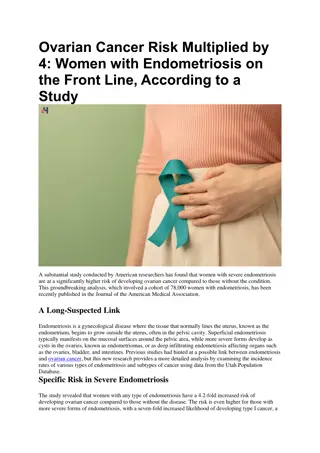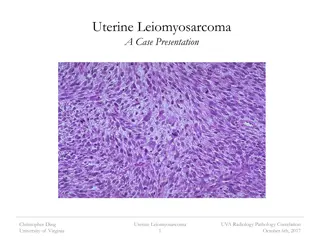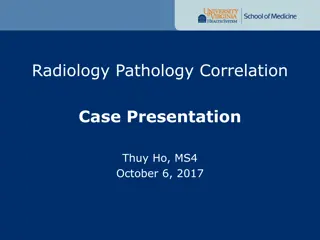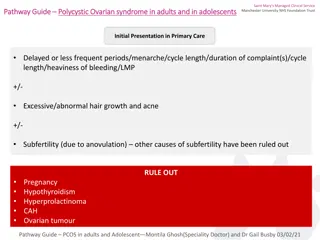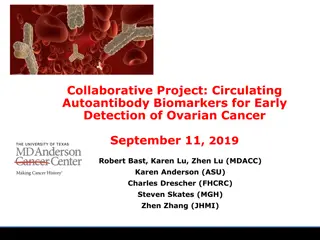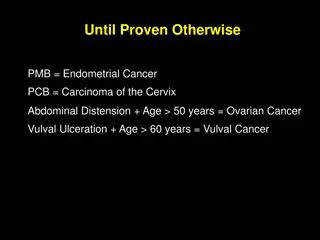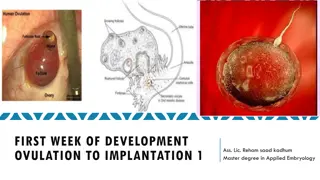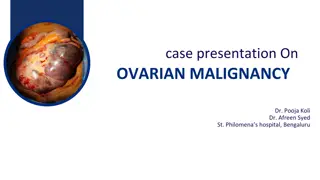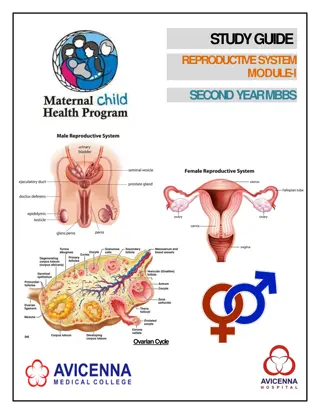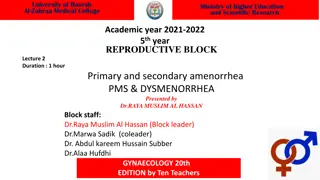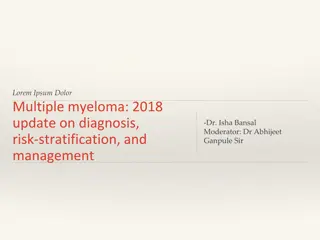Gynaecological Cancers - Dr Manoj Dongare
Gynecologic cancer starts in a woman\u2019s reproductive organs. Five main types of cancer that affect a woman\u2019s reproductive organs are cervical, ovarian, uterine, vaginal, and vulvar. As a group, they are referred to as gynecologic cancer. Each cancer is different and requires special treatme
0 views • 1 slides
Know All About Primary Ovarian Insufficiency (POI)
Understanding the causes, identifying the symptoms, and analyzing available therapies are important for managing this difficult reproductive health issue effectively. Reasons for Premature Ovarian Failure include various elements, including genetic abnormalities, autoimmune disorders, chemotherapy,
0 views • 7 slides
Understanding Malignant Melanoma: Types, Signs, and Prognosis
Malignant melanoma is a serious skin cancer with various types, including superficial spreading, nodular, acral lentiginous, lentigo maligna, and amelanotic. Recognizing early signs such as ABCDEF (Asymmetry, Borders, Colour, Diameter, Evolving, Funny-looking) is crucial for prompt diagnosis. Macros
2 views • 25 slides
Comprehensive Overview of Female Genital Organs and Ovarian Function
Explore in-depth insights into the anatomy and functions of female genital organs, focusing on the ovaries, uterus, uterine tubes, and associated structures. Delve into the maturation of follicles, ovulation process, and hormonal regulation. Gain a clear understanding of the intricate mechanisms inv
1 views • 60 slides
Understanding Grading and Staging of Malignant Tumors in Cancer Patients
Grading and staging are crucial in determining the aggressiveness and extent of malignant tumors. Grading involves assessing the level of malignancy based on cell differentiation and mitotic activity, while staging considers the size of the tumor, lymph node involvement, and presence of metastases.
7 views • 31 slides
Ovarian Cancer Risk Multiplied by 4 | healthcare
American researchers has found that women with severe endometriosis are at a significantly higher risk of developing ovarian cancer compared to those without the condition
0 views • 2 slides
Understanding Uterine Leiomyosarcoma: A Case Presentation
A 58-year-old female with a history of fibroids presented with post-menopausal bleeding and was diagnosed with uterine leiomyosarcoma, a rare and aggressive malignancy of uterine smooth muscle cells. The case details the clinical course, diagnosis, and prognosis of this condition, emphasizing the im
0 views • 17 slides
Understanding Intestinal Obstruction: Causes, Classification, and Pathophysiology
Intestinal obstruction can be classified into dynamic and adynamic types, with various causes such as intraluminal faecal impaction, malignancy, and hernia. The pathophysiology involves changes in bowel peristalsis and dilation, leading to potential strangulation and ischemia. Morbidity and mortalit
9 views • 40 slides
Radiology-Pathology Correlation Case Presentation: Ms. DR - Lung Mass Evaluation
Ms. DR, a 62-year-old female with a history of tobacco use, presents with a right lung mass and possible metastatic disease. Imaging reveals a FDG-avid lung mass suspicious for primary malignancy. After obtaining informed consent, a CT-guided core biopsy is performed, showing cohesive, medium-sized
1 views • 16 slides
Parathyroid Carcinoma Misdiagnosed as Thyroid Lesion: A Case Study
Parathyroid carcinoma (PC) is a rare malignancy often challenging to differentiate from benign thyroid nodules. This case study highlights a 50-year-old male patient whose nonfunctioning sporadic PC was initially misidentified as a follicular thyroid nodule. Despite preoperative evaluations, includi
4 views • 27 slides
Comprehensive Guide to Polycystic Ovarian Syndrome in Adults and Adolescents
Managing polycystic ovarian syndrome (PCOS) requires a thorough understanding of its presentation, diagnosis, and management. This guide outlines the initial presentation in primary care, relevant examinations, diagnostic criteria, and management strategies for PCOS in both adults and adolescents. F
0 views • 6 slides
Global Ovarian Cancer Treatment Drugs Market Sales
The Ovarian Cancer Treatment Drugs Size is Anticipated to Exceed USD 5.45 Billion by 2033, Growing at a CAGR of 8.10% from 2023 to 2033.\n
1 views • 6 slides
Understanding Endometrial Cancer: Risk Factors, Diagnosis, and Management
Endometrial cancer, the most common gynecological malignancy in women, presents with abnormal uterine bleeding and affects women mainly during menopause. Risk factors include hormonal stimulation and estrogen levels. Differentiating between types of endometrial cancer can impact treatment decisions.
3 views • 31 slides
Collaborative Project: Circulating Autoantibody Biomarkers for Early Detection of Ovarian Cancer
This collaborative project aims to utilize circulating autoantibody biomarkers for the early detection of ovarian cancer, highlighting the importance of screening due to the high curability rates in early stages and the need to improve survival rates by identifying preclinical disease sooner. The pr
3 views • 31 slides
Comprehensive Guide to Gynaecological Malignancies and Care
Explore the essentials of gynaecological malignancies, including endometrial cancer, cervical carcinoma, ovarian cancer, vulval cancer, and more. Learn about government waiting time pledges, diagnostic procedures, treatment options like surgery, radiotherapy, and chemotherapy, referral networks, the
0 views • 38 slides
Understanding Scrotal Bumps and Lumps: Hydrocele and Spermatocele
Scrotal bumps and lumps such as hydrocele and spermatocele are common conditions among males, particularly adolescents. Hydrocele, a collection of fluid in the layers of the scrotum, usually presents as painless swelling and may be idiopathic or secondary to various causes. On the other hand, sperma
0 views • 33 slides
Approach to a Thyroid Nodule: Causes, Diagnosis, and Management
When encountering a thyroid nodule, it is essential to consider both benign and malignant causes. Clinical features may vary, and investigations such as ultrasonography, FNAC, and thyroid scanning play crucial roles in evaluation. Understanding the findings suggestive of malignancy is key for approp
0 views • 32 slides
Understanding Pelvic Ultrasonography: A Comprehensive Guide
Explore the detailed anatomy and variations of the uterus, ovaries, fallopian tubes, and adnexa in pelvic ultrasonography. Learn about the different shapes and sizes of the uterus, layers of the uterine wall, and indications for pelvic ultrasound examination. Discover the significance of the appeara
1 views • 18 slides
Importance of Breastfeeding and Marketing Regulations
Breastfeeding provides numerous benefits for both infants and mothers, including optimal nutrition, reduced risk of infections, and lower chances of developing diseases like breast and ovarian cancer. The International Code of Marketing of Breast-milk Substitutes aims to regulate the promotion of al
0 views • 18 slides
Parenteral Nutrition in Intestinal Failure Related to Advanced Abdominal Cancer
Discussion on parenteral nutrition in patients with intestinal failure secondary to advanced abdominal cancer, including considerations for patient selection, Christie referral pathway, and practicalities of home parenteral nutrition. The background highlights the increasing commonality of home pare
0 views • 40 slides
Collaborative Efforts of Irish Health Librarians in Providing Evidence-Based Practice Support
Current awareness newsletter freely available on the internet, providing high-quality, relevant information to healthcare professionals and consumers. This collaboration of Irish health librarians aims to promote evidence-based practice by offering up-to-date information and resources. The conscient
0 views • 12 slides
Understanding Menstruation and Ovulation Cycle in Women
Menstruation, the cyclic uterine bleeding, is a result of hormonal interplay. It signifies ovarian events controlled by the hypothalamic-pituitary axis. The menstrual cycle, spanning from one period to the next, involves the release of ova and hormones like estrogen and progesterone. Menstruation ty
0 views • 49 slides
Overview of the First Week of Development from Ovulation to Implantation
The first week of development after ovulation involves key processes like fertilization, cleavage, and blastocyst formation. It begins with the maturation of the primary oocyte in the follicle, leading to ovulation and potential fertilization. During this period, hormonal changes in the ovarian cycl
0 views • 21 slides
Understanding Ovarian Follicles: Growth Stages and Cellular Composition
Ovarian follicles are the main functional units of the ovary, comprising an oocyte, granulosa cells, and theca cells surrounded by epithelial layers. The growth stages include primordial, primary, and secondary follicles, each characterized by specific cellular changes and development processes driv
0 views • 8 slides
Differential Diagnosis of Ascites in a 50-Year-Old Man with Liver Disease
Ascites, jaundice, and confusion in a 50-year-old man raise concerns about liver disease. Differential diagnosis includes cirrhosis, malignancy, alcoholic liver disease, and biliary obstruction. Physical examination findings such as spider naevi, hepatomegaly, and asterixis help narrow down the poss
0 views • 45 slides
Understanding Pancreatic Cancer: Facts, Tumors, and Risk Factors
Pancreatic cancer, a deadly disease, is on the rise with specific risk factors like age, genetics, and lifestyle choices. Exocrine and endocrine tumors differ in presentation and treatment. Learn about the pancreas's location, statistics, and crucial risk factors associated with this malignancy.
0 views • 19 slides
Female Genital Organs: Ovaries and Anatomy Overview
This informative presentation covers the anatomy of female genital organs, focusing on the ovaries. It explains the functions of the ovaries, their structure, and the various stages of ovarian follicle development. Dr. Sanjay Kumar Bharti's expertise in veterinary anatomy is highlighted through deta
0 views • 15 slides
Case Presentation on Ovarian Malignancy at St. Philomena's Hospital, Bengaluru
Mrs. X, a 42-year-old housewife, presented with irregular menses and lower abdominal pain. She had a history of weight loss, weakness, and decreased appetite over three years. No other significant complaints reported. Past history includes HbsAg positivity and iron deficiency anemia. Personal histor
0 views • 21 slides
Palliative Care Approach for Ovarian Cancer Patient: A Case Study
This case study follows the journey of Mrs. P, a 72-year-old woman diagnosed with malignant pleural effusion and suspected ovarian cancer. It explores the challenges of breaking bad news, addressing patient concerns, and providing palliative care measures. The narrative delves into communication str
0 views • 5 slides
Understanding the Ovarian Cycle in Second Year MBBS - Study Guide
This study guide for the Reproductive System Module-I in Second Year MBBS at Avicenna Medical College provides a comprehensive overview of the ovarian cycle, learning methodologies, assessment methods, and curriculum framework. It includes details on the importance of the reproductive system, object
0 views • 22 slides
Understanding the Reproductive System
Explore the intricate details of the female and male genital apparatus, including the uterus, ovary, and testicles. Learn about the processes of ovulation, menstruation, and spermatogenesis. Uncover the complexities of the uterine and ovarian cycles, as well as the formation of spermatozoa.
0 views • 10 slides
Understanding Primary and Secondary Amenorrhea, PMS, and Dysmenorrhea in Gynecology
Explore the concepts of primary and secondary amenorrhea, PMS, and dysmenorrhea in gynecology through detailed lectures and learning objectives at the University of Basrah Al-Zahraa Medical College. Topics include differentiating between primary and secondary amenorrhea, management strategies, cause
0 views • 31 slides
Understanding Ovarian Cancer: Insights from ASCO 2013
Ovarian cancer is a significant health concern with stable global incidence rates. Early detection remains challenging, with most cases diagnosed at advanced stages. Knowledge of risk factors and subtypes is crucial for timely intervention. Survival outcomes vary based on the stage at diagnosis, hig
0 views • 39 slides
Thymic Neuroendocrine Tumors: Demographics, Treatment, and Survival Study
This study presents an analysis of thymic neuroendocrine tumors (TNET) focusing on demographics, treatment, and survival outcomes. Conducted as a retrospective cohort study using the NCDB data from 2004 to 2015, the study aimed to examine the characteristics of TNET in terms of demographics, clinica
0 views • 16 slides
Insights into Lung Transplantation: Causes of Death and Survival Rates
Explore the common causes of death in lung transplant recipients, including malignancy, graft failure, and infections. Understand the relative incidence of leading causes of death in adult lung transplant recipients over different time periods. Learn about survival rates following lung transplantati
0 views • 40 slides
Understanding Amputation: Procedures, Indications, and Levels
Amputation is a surgical procedure where part of a limb is removed, commonly in cases of trauma, malignancy, nerve injuries, infections, or severe infections. The process involves levels of amputation based on viability. It is crucial to have a well-healed stump for prosthetic fitting. Different lev
0 views • 17 slides
Understanding Pyrexia of Unknown Origin: Causes and Classification
Pyrexia of unknown origin (PUO) is a challenging diagnostic scenario characterized by persistent fever without an identified cause. Dr. Sujeetha Chandrababu M.D. defined PUO as temperatures exceeding 38.3°C for several weeks with no definitive diagnosis. Classification of PUO includes various categ
0 views • 43 slides
Understanding Primary Ovarian Insufficiency: Definition, Pathophysiology, Clinical Features
Primary ovarian insufficiency, also known as hypergonadotropic amenorrhea, is a condition characterized by ovarian dysfunction in women under 40. It involves oligo/amenorrhea, elevated FSH levels, and impacts fertility and overall health. The pathophysiology includes follicle depletion and dysfuncti
0 views • 46 slides
Update on Multiple Myeloma: Diagnosis, Risk Stratification, and Management in 2018
Multiple myeloma is a significant hematologic malignancy with varying stages of progression. From the asymptomatic MGUS to the more advanced SMM, early diagnosis and risk stratification are crucial. The presence of myeloma defining events, specific biomarkers, and established criteria guide the diag
0 views • 40 slides
Pathway for EDRN Investigators in FDA Pre-Submission for Early Detection Studies
EDRN investigators can approach the FDA for pre-submission without an industry partner for proposed early detection study designs. The process involves validation, verification, and discovery stages in the biomarker pipeline, utilizing various technologies and biospecimen sets. An example from the o
0 views • 18 slides





